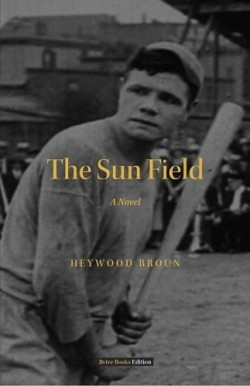
The Sun Field
Baseball season closes with the boys of summer facing longer shadows and complicated relationships. The Sun Field is a reprint of a 1923 novel by sportswriter and editor Heywood Broun. Newspaper columnist George Wallace (a pseudonym for Broun), Judith Win-throp (Broun’s real-life wife, Ruth Hale), and John “Tiny” Tyler (as Babe Ruth) are featured in a fictionalized ac-count of the originals’ interactions—or just maybe we have a glimpse into their private lives with a tale of truth!
A famous line in the book describes Tiny Tyler: “His only weakness is a fast blonde on the outside corner of the park.” The same held true for the Babe Ruth, who was known as a player among ladies. Tiny has a penchant for gambling, drinking, and wom-anizing. His fallible personality almost destroys the wonderful relationship he has with Judith, but at the point when most stories would end, a situations miraculously ends the rally, and a new inning begins. George often holds private meetings with Judith as he attempts to woo her. Each time they meet, though, he finds her using him as a sounding board for ideas or as a companion. Conflict ultimately de-velops between George and Tiny, but Judith always smoothes things over between them.
One of the shortcomings of this vintage book is the way that language has shifted. Connotations of “queer” or “gay” have evolved from meaning “out of sorts” or “happy,” which gives the reader a real feeling of the 1923 era. Unless readers are familiar with these expressions, it might be difficult to understand what is intended.
An interesting side note is explained in the introduction by Darryl Brock. He writes that the author’s wife was a feminist who retained her maiden name of Hale, even though she married Broun. In the book, Judith applies for a passport to visit Tiny in Cuba; she is unable to obtain one as Judith Winthrop, but is told she will need to use her married name. She does not go to Cuba. In real life, both Broun and Hale were supposed to go to France to cover a story, but the State Department refused to issue a passport in the name of Hale—they did not go to France.
This is Broun’s only novel. It conveys feeling, insight into personal interactions, and respect for the women’s rights movement, which makes it a classic worthwhile read.
Reviewed by
Clark Isaacs
Disclosure: This article is not an endorsement, but a review. The publisher of this book provided free copies of the book to have their book reviewed by a professional reviewer. No fee was paid by the publisher for this review. Foreword Reviews only recommends books that we love. Foreword Magazine, Inc. is disclosing this in accordance with the Federal Trade Commission’s 16 CFR, Part 255.
